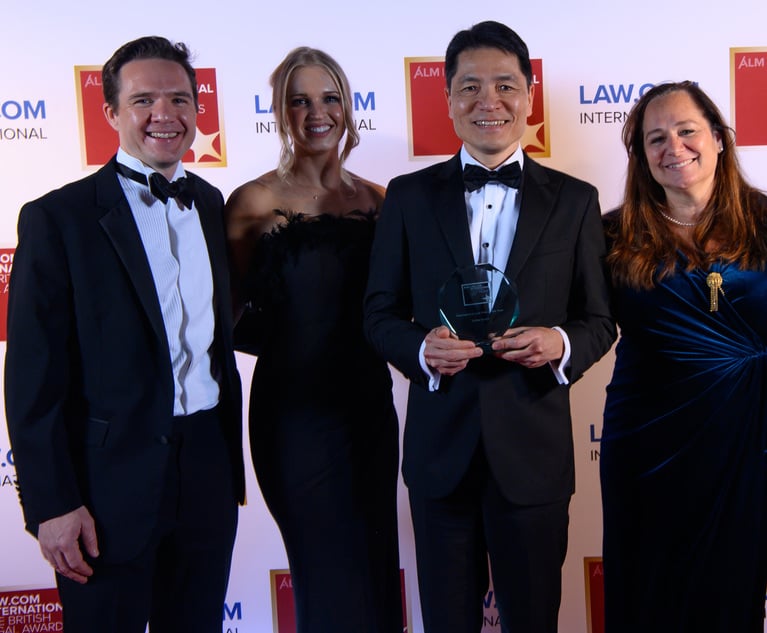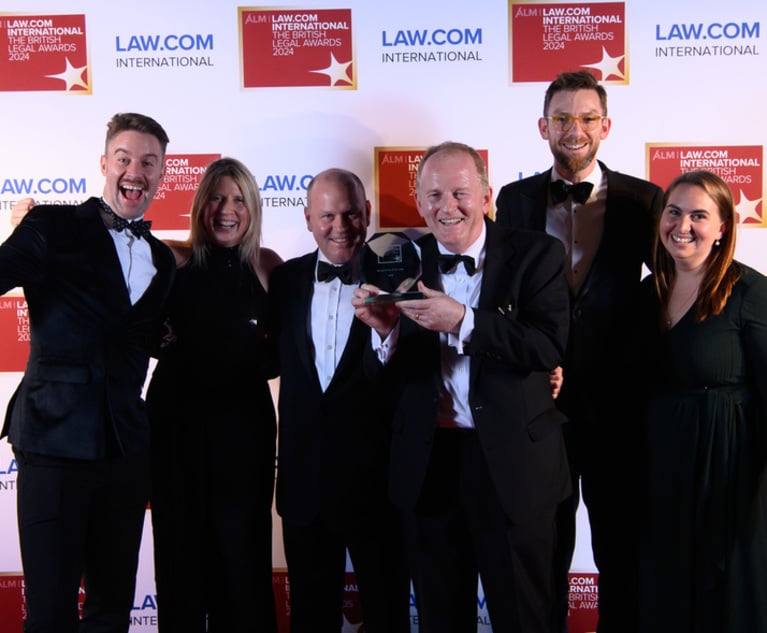'All law firms should be reporting data on partner pay'
Coca-Cola's Clare Wardle on diversity targets, #MeToo and why law firms should include partners in pay gap reporting
November 14, 2018 at 06:01 AM
7 minute read
 Clare Wardle is general counsel and company secretary of Coca-Cola European Partners (CCEP). At LegalWeek CONNECT later this month, she will be leading a discussion about what law firms and in-house legal teams are doing to improve gender diversity.
Clare Wardle is general counsel and company secretary of Coca-Cola European Partners (CCEP). At LegalWeek CONNECT later this month, she will be leading a discussion about what law firms and in-house legal teams are doing to improve gender diversity.
At LegalWeek CONNECT, you're part of a panel discussion on legal departments and how they can drive better diversity, both internally and externally – what are you expecting to touch on?
Driving diversity is as important for the legal team as it is for all our other colleagues. Ensuring that we recruit and retain team members from a wide range of backgrounds and develop their full potential involves the right processes. For example, having diverse shortlists and balanced interview panels as well as programmes like apprenticeships are crucial to providing the right opportunities. Engendering an inclusive culture that makes everyone feel valued, and leadership is also important; leaders should be role-modelling the behaviours they want and participating in broader company initiatives to encourage others to follow suit.
We also need to expect diversity in our wider virtual team of external lawyers and consultants from the outset, including it as a criterion in our panel review and following up by making it clear we expect strong, diverse teams.
Regarding the recent pay gap scandal, what is being done to tackle these issues? What was your view on law firms not being required to include partners in their payment reports?
The introduction of mandatory gender pay gap reporting is certainly a step forward in the journey towards gender equality and should encourage firms to review their pay structure and take action to close the gap.
However, I do think all law firms should be reporting data on partner pay. By not doing so, there is no open snapshot of the state of the market. Even if the figures aren't particularly positive, revealing partner pay shows integrity and strength of character, and clients will value the transparency. Once they report figures, firms then need to demonstrate that they're serious about tackling gender pay inequality and are taking practical steps to make progress against these commitments.
Overall, the gender pay gap needs to become more of a board-level concern within firms, with more priority given to raising awareness of gender bias and promoting equal opportunities. What we need is a shift in attitudes across the sector to make sure the issue is given the attention it warrants.
Your workshop includes talking about how different countries are approaching the issue of diversity. Can you tell me a bit more about this geographic comparison?
Across all the countries in which we operate, CCEP expects all its leaders to promote diversity and inclusion. We have a target of 40% of our senior leaders to be women by 2025. When looking at tools to support our goals, we do need to be conscious that there are different views on some of the approaches. For example, in France it is illegal to collect ethnicity data on employees.
➤➤ Diversity and inclusion, in particular gender equality, is the focus of day two of LegalWeek CONNECT, taking place on 28-29 November at County Hall, London SE1. Click here for more information
What's your assessment of gender imbalance among in-house lawyers?
Statistics and published pay suggests there are still substantially more male GCs in top jobs, and one survey suggested that globally there is a 20% pay gap for similar jobs. One issue may be that pay offers very frequently start from a percentage increase from the existing pay, and so when recruiting out of private practice, this hardwires previous discrimination. However, in general I think that we are making good progress. It is certainly a GC's responsibility to eliminate any unfair pay practices in their own department.
How have things changed in light of #MeToo? Are you noticing a change, or at least more discussion within your company?
The spate of sexual misconduct cases – in politics, entertainment and business – has shone a spotlight on power dynamics, professional standards, inappropriate behaviour and abuse in the workplace and beyond.
I hope this has created an environment in which victims of abuse feel empowered to speak up, and can feel confident they will be listened to.
How can companies use their powers, be it financial or reputational, to encourage diversity in law?
Recruiting people from diverse backgrounds, and then supporting those people to progress and develop in the business, is vital. For example, to support this aim at CCEP we now make sure we have balanced interview panels.
Ensuring that people feel included, valued and listened to goes a long way as well. And there are some quite simple ways of doing that. For instance, making sure that women on maternity leave all have a buddy whose job it is to keep them up to date with what is happening at work.
Setting an example from the top is key too. At CCEP, we are lucky to have a chairman in Sol Daurella who is happy to get personally involved and a CEO in Damian Gammell who is actively supportive.
Can you give examples of how the issue of diversity is being addressed in Coca-Cola European Partners?
Our commitment to improving diversity and inclusion in the business starts at board level. We have a target of 33% of women on our board by 2020, which is closely monitored to ensure we meet it.
This commitment is reflected at less senior levels too – by 2025, 40% of management positions at CCEP are to be held by women, according to one of our goals. And we have a longer-term ambition to have equal representation at management levels at both CCEP and The Coca-Cola Company. These targets form part of 'This is Forward' – our joint sustainability action plan with The Coca Cola Company, which sets out clear and ambitious goals on some of the most pressing issues facing society today.
Similarly, we've also implemented an overarching diversity framework. Every business unit and department in CCEP has its own diversity and inclusion plan, and the business unit and function plans are reviewed by the group executive team. This approach is mirrored at unit level and results monitored.
Crucially, we encourage our leadership team and employees to drive an inclusive culture by taking part in employee networks dedicated to gender and other forms of diversity and inclusion. These include our Women's Networks Group and the Rainbow Network, which provides networking opportunities for LGBT colleagues.
How will the company look to continue this drive in the future?
As part of our sustainability action plan we have an ongoing commitment to fostering a diverse and inclusive culture in our business. We're building our female leadership pipeline at CCEP through Women in Leadership, a dedicated series of training and mentoring programmes tailor-made to address the needs of our female employees at different stages of their careers. For example, our 'Leading with Purpose' programme supports women mid-career, while our Signature Programme helps our senior leaders forge contacts across different industries.
Why are events like LegalWeek CONNECT important for starting conversations and inciting change for the topic of diversity?
Industry events like LegalWeek CONNECT provide a great collaborative setting for leaders and like-minded people across the sector to discuss pertinent issues and potential solutions to these. As well as fantastic networking opportunities, they offer a unique platform for raising awareness of the important issues that need to be on the top of every law firm's agenda, and getting buy-in from the people that have the clout to tackle them.
- Click here for more information on Legal Week CONNECT
This content has been archived. It is available through our partners, LexisNexis® and Bloomberg Law.
To view this content, please continue to their sites.
Not a Lexis Subscriber?
Subscribe Now
Not a Bloomberg Law Subscriber?
Subscribe Now
NOT FOR REPRINT
© 2025 ALM Global, LLC, All Rights Reserved. Request academic re-use from www.copyright.com. All other uses, submit a request to [email protected]. For more information visit Asset & Logo Licensing.
You Might Like
View All
International Law Firm of the Year: A Q&A with Sidley Austin's London Managing Partner
5 minute read
Inside Travers Smith's AI Training, Development Efforts

From Olympic Aspirations to Legal Innovation: Tom Dunlop's Journey to Founding Summize
8 minute readTrending Stories
Who Got The Work
Michael G. Bongiorno, Andrew Scott Dulberg and Elizabeth E. Driscoll from Wilmer Cutler Pickering Hale and Dorr have stepped in to represent Symbotic Inc., an A.I.-enabled technology platform that focuses on increasing supply chain efficiency, and other defendants in a pending shareholder derivative lawsuit. The case, filed Oct. 2 in Massachusetts District Court by the Brown Law Firm on behalf of Stephen Austen, accuses certain officers and directors of misleading investors in regard to Symbotic's potential for margin growth by failing to disclose that the company was not equipped to timely deploy its systems or manage expenses through project delays. The case, assigned to U.S. District Judge Nathaniel M. Gorton, is 1:24-cv-12522, Austen v. Cohen et al.
Who Got The Work
Edmund Polubinski and Marie Killmond of Davis Polk & Wardwell have entered appearances for data platform software development company MongoDB and other defendants in a pending shareholder derivative lawsuit. The action, filed Oct. 7 in New York Southern District Court by the Brown Law Firm, accuses the company's directors and/or officers of falsely expressing confidence in the company’s restructuring of its sales incentive plan and downplaying the severity of decreases in its upfront commitments. The case is 1:24-cv-07594, Roy v. Ittycheria et al.
Who Got The Work
Amy O. Bruchs and Kurt F. Ellison of Michael Best & Friedrich have entered appearances for Epic Systems Corp. in a pending employment discrimination lawsuit. The suit was filed Sept. 7 in Wisconsin Western District Court by Levine Eisberner LLC and Siri & Glimstad on behalf of a project manager who claims that he was wrongfully terminated after applying for a religious exemption to the defendant's COVID-19 vaccine mandate. The case, assigned to U.S. Magistrate Judge Anita Marie Boor, is 3:24-cv-00630, Secker, Nathan v. Epic Systems Corporation.
Who Got The Work
David X. Sullivan, Thomas J. Finn and Gregory A. Hall from McCarter & English have entered appearances for Sunrun Installation Services in a pending civil rights lawsuit. The complaint was filed Sept. 4 in Connecticut District Court by attorney Robert M. Berke on behalf of former employee George Edward Steins, who was arrested and charged with employing an unregistered home improvement salesperson. The complaint alleges that had Sunrun informed the Connecticut Department of Consumer Protection that the plaintiff's employment had ended in 2017 and that he no longer held Sunrun's home improvement contractor license, he would not have been hit with charges, which were dismissed in May 2024. The case, assigned to U.S. District Judge Jeffrey A. Meyer, is 3:24-cv-01423, Steins v. Sunrun, Inc. et al.
Who Got The Work
Greenberg Traurig shareholder Joshua L. Raskin has entered an appearance for boohoo.com UK Ltd. in a pending patent infringement lawsuit. The suit, filed Sept. 3 in Texas Eastern District Court by Rozier Hardt McDonough on behalf of Alto Dynamics, asserts five patents related to an online shopping platform. The case, assigned to U.S. District Judge Rodney Gilstrap, is 2:24-cv-00719, Alto Dynamics, LLC v. boohoo.com UK Limited.
Featured Firms
Law Offices of Gary Martin Hays & Associates, P.C.
(470) 294-1674
Law Offices of Mark E. Salomone
(857) 444-6468
Smith & Hassler
(713) 739-1250








